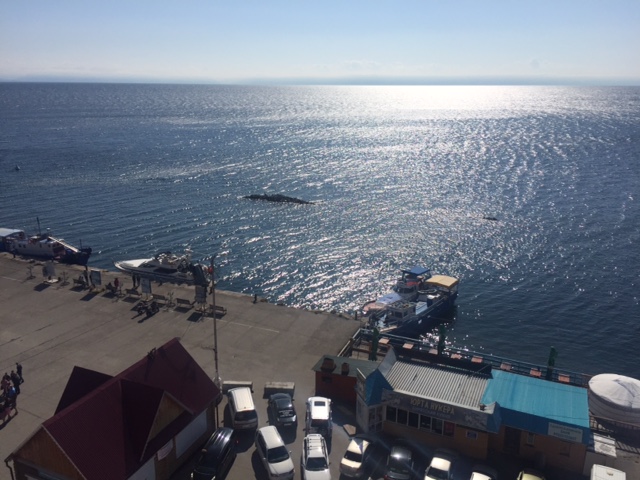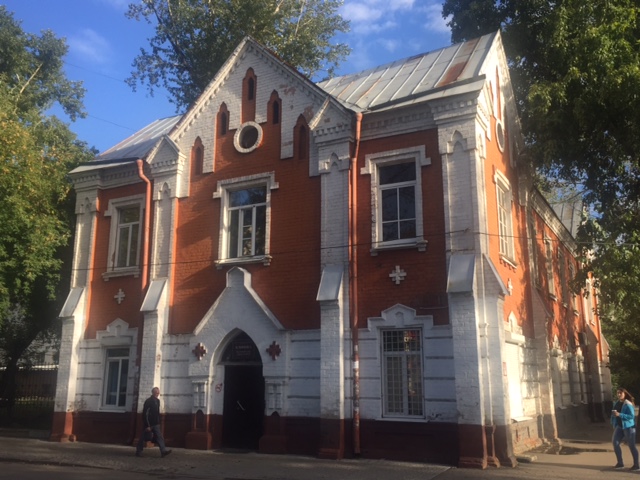Dear CCI Friends,
We are sending belated reports from our travelers who visited Russia’s regions this past September.
Relatively few Americans have visited the city of Irkutsk, Siberia which is 4,200 kilometers or 2,260 miles due east from Moscow. Russia is approximately 6,000 miles wide. Irkutsk was settled in 1661 as a Cossack community.
Following the 1825 St. Petersburg Decembrist Revolt, many young aristocrats were exiled in chains to Irkutsk and other God-forsaken places across Siberia. They traveled in shackles and were put in prison cells. Then amazingly, their young wives began the many months-long journeys to get to their husbands in exile. Local prison keepers finally allowed them to live in cells with their husbands. Soon offspring were being born behind bars. Among the male exiles there were artists who captured their lives in captivity in many fine drawings.
By the late 1800s, 30% of the population of Irkutsk were St. Petersburg’s exiled aristocrats. Far from Moscow, locals began letting them out of prison. They began building their own compounds. Irkutsk became the major center of intellectual and social life due to these notable exiles. Their sturdy wooden houses, adorned with ornate, hand-carved decorations, survive today in stark contrast with the surrounding Soviet apartment block housing.
Around 1900, the city was nicknamed the “Paris of Siberia” due to the St. Petersburg men who wanted wide streets and ornate continental architecture. The St. Petersburg women brought culture, classical arts and taught music and dance to Siberians. The exiled men traded in furs, tea and wood. None ever returned to St. Petersburg where their first borns remained and grew up with their grandparents. Today Irkutsk has a population of approximately 600,000 persons.
~~~~~~~~~
Irkutsk, Russia
September 2018:
CCI’s team of explorers/investigators, George and Katy Spanos, both lawyers from Northern California and Joe Marcinkowski, a Houston, Texas businessman, arrived late on September 5th. It took a full day’s journey across five time zones to get from Moscow to Irkutsk by plane!
“Waiting to help us with our baggage at the airport was Vladimir Karelin, President of Irkutsk’s Rotary Club. In February of 2018 Vladimir emailed CCI asking if he could host a small CCI group in his city. He arranged meetings and discussions with professionals, environmentalists, teachers and students, in addition to a visit to Lake Baikal. The Russians meeting with George, Katy and Joe, provided opportunities for them to see the upsides as well as some of the challenges of living in Irkutsk and the Baikal region today.
The jewel of Russia is the vast Lake Baikal. It is considered by many Russians as the ‘spiritual’ center of Russia. It’s about an hour’s drive from Irkutsk. Baikal is, by far, the largest lake in the world. It contains 20 percent of the world’s unfrozen freshwater reserves and in places is said to be near 5,500 ft deep. The lake is thought to be 25 million years old. Lake Baikal stretches for 400 miles through south-eastern Siberia, north of the Mongolian border. It is home to 1,700 species of plants and animals, two-thirds of which cannot be found anywhere else in the world. It even has its own species of seals – the Baikal Seal – no one is quite sure how they came to be here, far from any major sea or ocean.
Due to Soviet mismanagement, the immense Lake Baikal was nearly dead from paper mills that had dumped millions of tons of refuse into the lake for over a 50 year period. In 1996 CCI won the USAID contract to create the plan for the cleanup and rehabilitation for the Baikal Basin and Lake. We hired American George D. Davis, a well-known wilderness preservationist. He worked for thirty years in natural resource management, land-use planning and environmental policy, as well as for the Lake Baikal watershed in Siberia and the Ussuri River watershed in Russia and China. CCI’s environmental staff administered this work over a three-year period. All wild life had been killed off. Tennison remembers signing checks for reindeer and yak to be returned to the Basin. George Davis then created the long-term plan and map of the whole endeavor. The final stage of cleanup went to other contractors. Years lapsed with different parts of the process completed but still much work remains to be done. The latest clean-up was started May of 2018. Some 740 of the local plant’s employees joined in the effort.

George Spanos commented that “Katy’s legal career has been with ‘water law’ and environmental law, and I have concentrated on litigation, criminal and civil law––so Baikal was very interesting for both of us. Locals believe Lake Baikal is cleaner than earlier; they are bottling and drinking water from the lake today.”
Katy reported that “Irkutsk is a lovely city, especially in the older central part. We observed picturesque wooden buildings with lovely painted shutters dating back to Tsarist times. Newer buildings in different classical styles date from the late 19th and early 20th centuries. A picturesque river winds its way through the middle of urban Irkutsk.”

As in all Russian cities CCI travelers visited, classical architecture is prominent. These structures have been renovated. The style is still revered by Russian citizens. The centuries-old structures are well kept––which is a formidable task for local renovators. The building in this photo, like all others of its age, is made of meter-thick brick. Covering the brick is a one-inch thick layer of plaster. Paints are then applied to the external plaster. Snow and ice quickly damages these revered surfaces, however, these days there is high priority on keeping them in tip-top shape. I once asked our St. Petersburg coordinator, Vladimir Shestakov, why they didn’t just dispense with the plaster and paint and let the brick be the exterior? He was aghast at the thought!
George and Katy reported, “In the central part of Irkutsk, most buildings had been renovated or ‘spruced up.’ The outskirts of Irkutsk across the river showed Soviet housing structures that were utilitarian and likely in use for decades. Irkutsk streets were clean, well marked with white traffic lines, and no rubbish was seen anywhere on sidewalks or streets as in other Russian cities and towns. Local people were dressed in modern attire, we saw no evidence of street people. ”
Joe Marcinkowski provides a link from The Siberian Times describing the challenges remaining for Lake Baikal and Irkutsk:
https://siberiantimes.com/ecology/casestudy/features/f0074-ambitious-project-to-revamp-closed-paper-plant-put-on-hold.
Check it out to learn what’s going on two-thirds across Russia.
Locals say that U.S. sanctions are interfering with funding to complete the renovation of the Basin, lake and museum. It’s not clear how this is related. Perhaps the locals do not have as much extra money as formerly.

There are numerous local debates about what to do with the great lake. Tennison reports that some locals don’t want anything done to it at all! “Being at a Buriyat village years ago, we conversed with some indigenous dwellers. I remember asking, ‘What would you like to see happen with the lake?’ After pondering a bit, they quietly responded, ‘Nothing. Nothing should be done here at all. Leave nature as it is. This is our home, our way of life. Tell them not to develop this area. Tell developers to go away, to leave us in peace.’”
Joe Marcinkowski reports, “We met with the members of an Irkutsk political science club, most of whom were students. They were quite interested to learn about the United States and about American attitudes towards Russia.

Katy Spanos remarked, “Although George and I studied Russian language and history in the past, this was our first trip to Russia, so we can’t compare Irkutsk with other regional cities. The city and area were definitely worth visiting. Irkutsk is closer to China. Local people are more sensitive to the Chinese influence than Russians in other parts of the country.”
The three agreed that Vladimir was an excellent host and did a great job under very difficult personal circumstances. George reported, “His mother suffered a heart attack the day we arrived, and his friends helped with our education and question answering when he had to be away. Vladimir lined up a diverse group of individuals with whom we had a chance to explore points of view on issues that we could have never understood from half a world away.”
